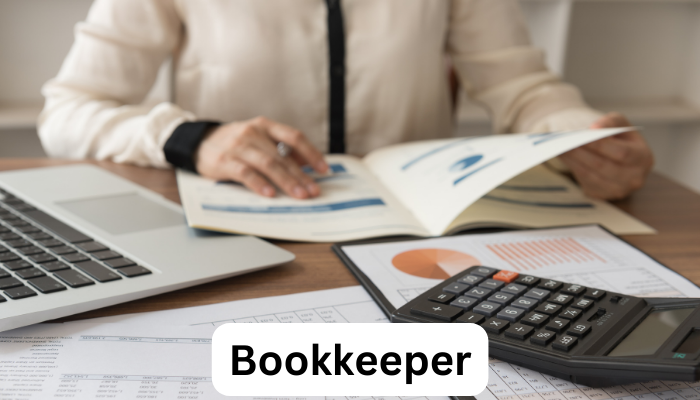
Bookkeeper vs Accountant vs CPA
While all these professionals deal with the finances of an organization, then where does the difference lie between bookkeeper vs accountant vs CPA? If all of them are meant to be number knacks and juggle between digits, how come their educational backgrounds and sets of required training and skills differ from each other?
This article is going to provide a detailed insight into the basic differences and responsibilities of bookkeepers, accountants, and certified public accountants (CPAs).
Who is a Bookkeeper?
A bookkeeper is an administrative professional who maintains the financial recordings of an organization in an accurate and consistent manner so that the accountants can perform their tasks on time.
The regulation of your company’s financial records on a daily basis involves complete sets of information on:
- Customer transactions
- Payrolls, loans
- Invoices
- Supplier purchases

In terms of differentiating between the duties of a bookkeeper vs accountant vs CPA, the tasks of bookkeeping are much more flexible.
Bookkeepers can work either independently or in a team of similar service providers. For instance, a bookkeeper can pen down the numbers of all customer transactions and the products they purchase within a day.
That’s why they are sometimes referred to as ledgers – because one of the main duties is to maintain a primary ledger.
However, the complexities and variations in ledging can range from a single sheet to using an entire software, such as QuickBooks, that comes with diversified versions.
Click here to read the benefits of QuickBooks.
Who is an Accountant?
Accounting and bookkeeping may look like a similar job at first glance. But, the details reveal that the role of accountants is more analytical and complex. In simple words, every accountant is a bookkeeper, but not all bookkeepers can be accountants.
The provision of all sorts of budgetary assistance and guidance to offer financial projections and advise on relevant elements that influence the growth behooves of the accountants of your organization.
Analyzing and binding multiple financial indicators with regular reporting and insights help the company focus on the areas that need improvement and those that are already talking to the skies.
For example, an accountant creates a cash flow statement and files an income tax return for the organization that employs them, along with various other responsibilities, by utilizing different relevant versions of accounting and financial software.
However, it is recommended to go through their non-neglectable downsides, such as the disadvantages of QuickBooks Online.
Certified Public Accountant
One of the most prestigious titles you can earn in the field of accounting is a certified public accountant (CPA).
After having quite an experience, you can register for the CPA examination with the official and regulatory bodies of your residential state and pass the test to earn the accreditation. Potential clients for CPAs can be:
- Individuals
- Government agencies
- Businesses
- Non-profit organizations
The basic role of CPAs is to help individuals and businesses in the preparation and filing of taxation returns. In the case of the Internal Revenue Service (IRS) audit, contacting a trustworthy and experienced CPA will be your first line of defense.
Talking about CPA vs accountant, the former has higher credibility as they prepare transaction reports and update accounting records to represent their clients in front of the IRS. Theyurns. In the case of the Internal Revenue Service (IRS) audit, contacting a trustworthy and experienced CPA will be your first line of defense.
Talking about CPA vs accountant, the former has higher credibility as they prepare transaction reports and update accounting records to represent their clients in front of the IRS. They Online.
The Ultimate Showdown: Bookkeeper vs Accountant vs CPA
Now that you know the basic differences between their jobs, it is time to consider how a bookkeeper vs accountant vs CPA differ with respect to educational background and required technical and soft skills.
Training
Bookkeeping does not bind you with the necessity of having a college degree. In contrast, the professionals of accounting and CPA must possess at least a bachelor’s level of qualification in:
- Accounting
- Business administration
- Taxation, or
- Relevant subjects
Bookkeepers have received training related:
- Financial management
- Data entry
- Payrolls
- Finances
- Special software (required to keep the records of payroll, data analysis, and POS systems)
The advancement level in the stages of education for a bookkeeper vs accountant vs CPA aligns with the increasing complexity in practicality.
Credentials
Typically, bookkeepers do not need accounting certifications. This profession offers you flexibility in a variety of ways:
- You can either work independently, or
- You can work with a team by grasping a few skills in hand to start working in bookkeeping while simultaneously planning for further education.
Doing so will maximize the pool of prospective opportunities that can make you excel in the long run.
Accountants and CPAs are often recruited based on their qualifications. Certain auditing and taxation services require you to qualify the CPA exam held by the officials of your country.
Normally, auditing and attestation, business environment, financial accounting, reporting, and regulation are a few sections of the exam.
Technical and Soft Skills
Soft skills such as effective communication, mathematical abilities, computation, automation, software management, and detail orientation are a few to count. The major difference between a bookkeeper vs accountant vs CPA is demonstrated in terms of relevant expertise.
The skills of a bookkeeper are insufficient to provide financial advice, completion of tax filings, or create financial reports or budgets, which certify the necessity to hire competent accountants and CPAs.
Bookkeeper vs Accountant vs CPA Salary
The salary landscape for bookkeepers, accountants, and CPAs in the US is shaped by education, credentials, industry, and geography. Entry-level bookkeepers often start around $45,000 to $55,000 annually, depending on region and whether freelance or in-house work.
For general accountants (without CPA credential), median salaries approach $70,000 to $80,000, with higher tiers in specialized industries or with several years of experience.
Those holding the CPA designation typically command significantly higher earnings. Many fall in the $90,000 to $120,000+ range. Senior CPAs in audit or tax leadership roles may exceed $150,000 annually..
Location also matters. In high-cost metros the same role may pay 20-40% more than the national average. Emerging demand for tech-savvy finance pros further rewards those who combine accounting credentials with data skills.
Is it Better to be an Accountant or Bookkeeper?
Deciding whether it is ‘better’ to become an accountant instead of a bookkeeper depends on your:
- Professional goals
- Interests
- Willingness to invest in education and certification
Bookkeeping can serve as a quicker entry point into finance. Less formal education is required. You can start contributing to a company’s financial operations sooner.
However, the bookkeeping role tends to focus on transaction recording and reconciliations. It may offer more limited upward mobility, especially as automation and cloud-software begin to reduce repetitive tasks.
On the other hand, becoming an accountant opens doors to deeper financial analysis, strategic advising, and leadership roles, especially if you pursue the CPA credential. The career path for an accountant typically offers a higher pay ceiling, greater professional recognition, and more diverse options across industries.
That said, it requires more rigorous education, continuous learning, and sometimes regulatory certification. Thus, if you prefer strategic work, want stronger long-term growth, and are willing to commit to the next step, accounting is likely the superior route—but bookkeeping remains a viable and practical starting point.
For businesses and individuals seeking expert financial guidance, hiring a CFO in The Woodlands or consulting a CPA in The Woodlands can make a significant difference in managing finances efficiently. Accounting firms in The Woodlands offer comprehensive services from tax planning and bookkeeping to strategic financial advice, all while ensuring compliance with state and federal regulations. A reputable CPA Houston and top Accounting firms Houston are able to assist clients with audits and complex tax filings as well as financial reporting. This offers peace of mind and credibility. The right accounting professional or CPA in the Woodlands will ensure that your financial records are accurate and that your tax obligations are minimized. Your business decisions will also be backed up by expert insight. You can navigate financial challenges confidently and strategically, whether you’re an individual, nonprofit or growing business.
Is an Accountant Higher Than a Bookkeeper?
An accountant is considered a higher-level role than a bookkeeper due to the disparity in:
- Legal authority
- Educational requirements
- Scope of work
A bookkeeper focuses on the ‘how’ of recording data. In most corporate structures, bookkeepers report to accountants. A bookkeeper maintains the accuracy of daily transactions.
In contrast, an accountant focuses on the ‘why’ behind the numbers. They transform raw data into strategic intelligence. They assume the fiduciary responsibility of verifying that information. They ensure compliance with Generally Accepted Accounting Principles (GAAP).
Accountants possess subjective judgment capabilities that bookkeepers typically do not. For instance, an accountant:
- Determines depreciation schedules
- Performs tax planning
- Conducts forensic analysis to identify inconsistencies
Modern business trends have further widened this gap. AI and automation now handle the administrative entry tasks traditional to bookkeeping.
Accountants have ascended into ‘Business Advisors.’ They do not just report on past performance. They influence future profitability. Consequently, the accountant’s role carries:
- Greater professional risk
- Higher barrier to entry
- A more significant influence on a company’s bottom line
The Bottom Line
Opting for a bookkeeper vs accountant vs CPA as a career is an individualized approach that you must choose according to your preferences by determining your liability comfort level. Summarizing the content, all the busy and hectic tasks of managing payrolls, generating reports, and the reconciliation of accounts are done by bookkeepers. And if you wish to have a bigger picture of these reports, accountants will be your go-to persons, while CPAs will cope with tricky transactions of your firm and maintain your reputation before the IRS.
Also Check: Professional Bookkeeping Services

